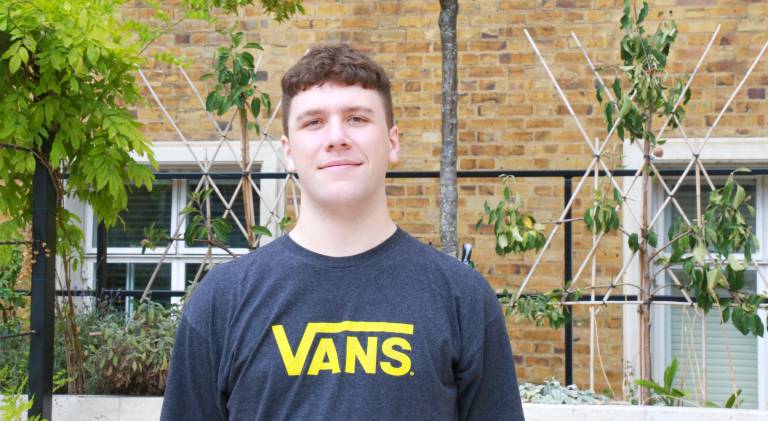Joe Willis - EngD Molecular Modelling & Materials Science
I really enjoy the flexibility of my work (computational work can be done wherever and whenever), and I’ve had great opportunities to travel even in my first year!

17 October 2019
What is your educational background?
I went to Westcliff High School for Boys in Essex, where I received A-levels in History, Politics, Mathematics and Chemistry, before moving to UCL and studying Chemistry, for which I received a first-class B.Sc.
What are your motivations for pursuing a graduate-level qualification?
I remember sitting in a materials chemistry lecture series in my third year, and it was almost entirely research and results focused. It drew me in and got me very interested in real world impact and applications of chemistry, and I felt that pursuing a post-graduate degree was an excellent way to get involved and contribute something myself.
Why did you apply to UCL for graduate study?
I was initially enrolled in the 4-year Integrated Masters course at UCL, when an opportunity to pursue a 4-year combined MRes and EngD in Transparent Conducting Oxides (the materials chemistry topic that initially got me interested in research!) arose, and so I decided to apply for that. I enjoyed my time as an undergraduate at UCL and was keen to stick around!
What is the best thing about your course?
This course was very appealing to me as the research component has a much higher weighting than other Masters programmes. I really enjoy the flexibility of my work (computational work can be done wherever and whenever), and I’ve had great opportunities to travel even in my first year! Furthermore, my industrial sponsor is Diamond Light Source Ltd. (the UK’s national synchrotron facility), so I regularly get to perform experimental research there too.
What do you find interesting about your field of study and what inspires you?
Molecular modelling is a remarkably diverse technique that can be used to investigate a whole range of systems; from biological to crystalline and most things in between. I look at bulk crystal systems (Transparent Conducting Oxides), and find it fascinating the insight that can be taken from a purely theoretical point of view, and how well these results correlate (most of the time!) with experiment. Having a theoretical understanding to complement experimental work or even spearhead new investigations (e.g. crystal structure prediction) is an incredibly rich resource and is a potential springing board for a whole host of new functional materials.
TCOs are particularly interesting systems, as pretty much every modern device relies upon them (solar cells, digital displays and gadgets, smart windows etc.) – the idea that a system we discover could become implemented in a wave of new devices serves as excellent motivation.
Do you think studying at UCL Chemistry is a good investment?
Definitely! There is an excellent spread of expertise in the department, and a great range of projects available. Similarly, the department offer a strong variety of optional modules.
What is it like studying in London and how do you think it has benefited your studies?
I’ve been studying in London for 4 years now and it’s brilliant – there is something going on every day of the week, and it’s incredibly easy to get around 24/7. Furthermore, I’ve been to a few (convenient!) conferences in London, so it is handy in that regard too.
What are your career plans once you’ve completed your current programme of study at UCL?
I am starting an EngD in September as part of the CDT programme at UCL, so I will be back and forth between UCL and Diamond doing theoretical and experimental work. I’m not too sure after that, it’s a long way off!
Is there anything else you would like to say about your time at UCL Chemistry?
Just a big shout out to the other fantastic students on this year’s MRes MMM course, and of course to the Scanlon Materials Theory Group for taking me under their collective wing this year and helping me throughout.
 Close
Close

